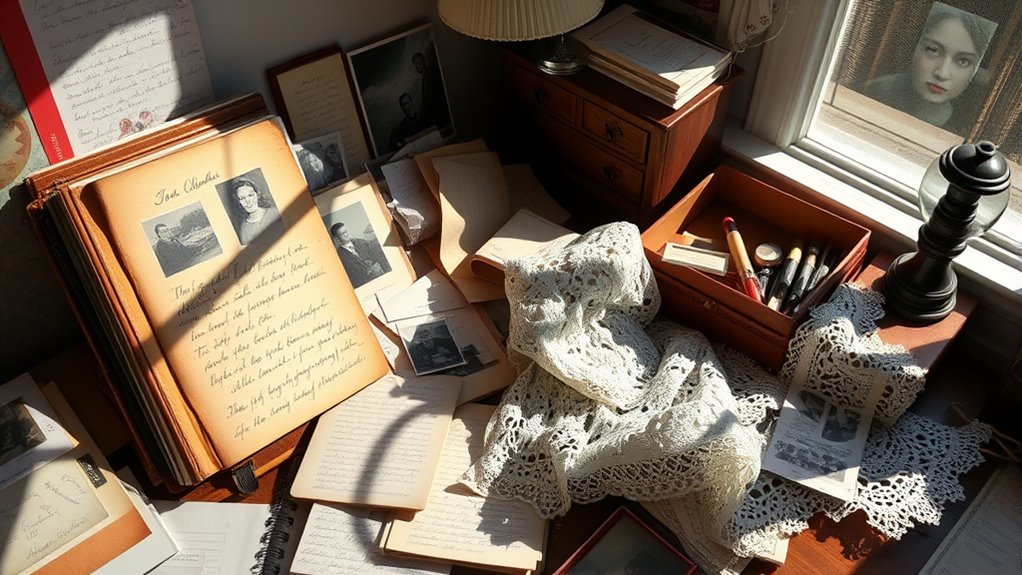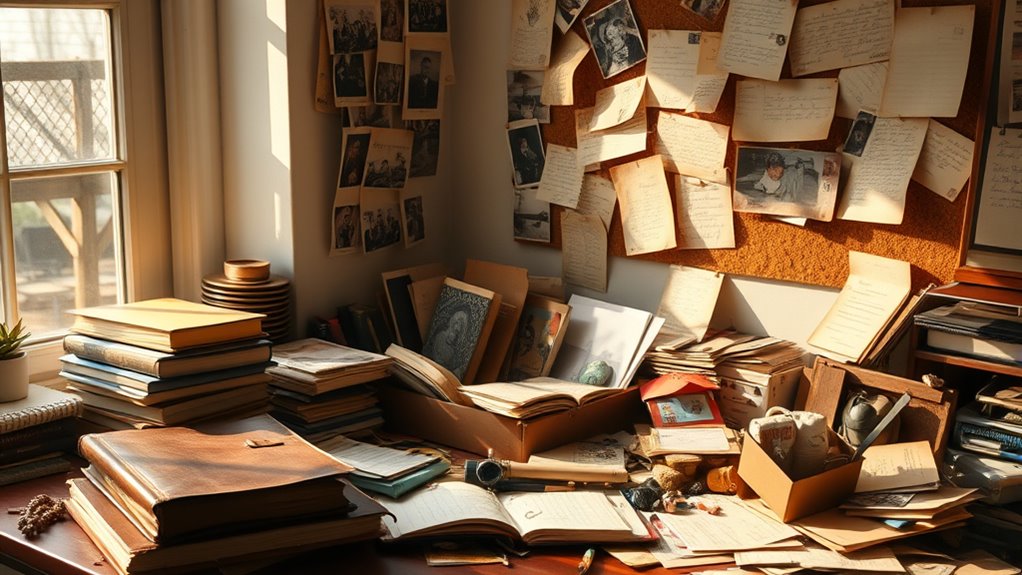Sentimental clutter can harm your productivity by overwhelming your space and keeping you mentally tethered to past memories. These belongings often carry emotional baggage, which drains your focus and mental clarity, making it harder to prioritize current goals. While preserving memories is important, holding onto too many keepsakes can trap you emotionally. Approaching this clutter with helpful strategies allows you to honor meaningful moments without sacrificing your space and focus—learn how to do this effectively next.
Key Takeaways
- Sentimental clutter overwhelms physical space, causing disorganization and mental distraction, which hampers focus and productivity.
- Holding onto emotional items drains mental energy and traps individuals in the past, preventing forward movement.
- Guilt or fear of losing emotional connections make decluttering emotionally challenging, reducing motivation to organize.
- Preserving memories through photos or scrapbooks allows emotional connection without physical clutter, freeing space for current goals.
- Creating organized, clutter-free environments enhances focus, reduces stress, and promotes a more productive and fulfilling workflow.

Sentimental clutter can silently sabotage your productivity by overwhelming your space with emotional attachments that are difficult to let go of. When you keep items tied to memories, you often carry emotional baggage that weighs you down mentally and physically. These objects serve as reminders of moments, people, or past events, but they can also trap you in the past, preventing you from moving forward. This clutter isn’t just about tidiness; it’s about unresolved feelings and the struggle to let go of what once meant everything to you. Instead of freeing your mind, these possessions anchor you to old memories, making it harder to focus on present tasks or future goals.
Sentimental clutter traps you in the past, making it harder to focus on present goals and future growth.
Many people justify holding onto sentimental items as a way of preserving memory. They see these objects as tangible proof of meaningful experiences or loved ones. While memory preservation is important, it doesn’t require keeping every physical item associated with those moments. You can cherish the memories without cluttering your space with irrelevant keepsakes. The challenge lies in distinguishing between what truly brings value and what merely congests your environment. When your surroundings are filled with sentimental clutter, your brain has to process all that emotional weight, which can drain your mental energy and reduce your ability to concentrate.
Clinging to sentimental objects also fosters a sense of guilt or obligation that can hinder your decision-making. You might feel guilty about discarding certain items or worry about losing a connection to a loved one if you let go of something they touched. These feelings create emotional baggage that clouds your judgment and makes decluttering feel like an act of betrayal rather than liberation. To honor your memories without allowing clutter to take over, consider alternative ways to preserve them. For example, take photos of sentimental items or create a scrapbook that consolidates your memories. This approach allows you to keep the essence of your experiences without the physical encumbrance.
Recognizing the difference between sentimental value and clutter is key to improving your productivity. Letting go doesn’t mean forgetting or diminishing the importance of your memories; it means freeing yourself from the emotional weight that no longer serves you. By doing so, you create a cleaner, more organized environment where your focus can thrive. You’ll find that when you’re not constantly surrounded by objects that evoke emotional baggage, you can dedicate more energy to your current pursuits and future aspirations. Remember, honoring your memories doesn’t require holding onto every physical remnant—sometimes, the most meaningful remembrance is in your heart and mind.
Additionally, understanding how home theatre projectors and other technology can help you create spaces that foster focus and relaxation might be a helpful step towards a more organized environment.
Frequently Asked Questions
How Can I Differentiate Between Sentimental Clutter and Meaningful Keepsakes?
To tell sentimental clutter from meaningful keepsakes, consider your emotional attachment and value assessment. Ask yourself if the item sparks joy or has significant meaning, or if it’s just a habit to keep it. If you feel connected and it holds lasting value, it’s a meaningful keepsake. If it’s more about guilt or routine, it might just be sentimental clutter that’s weighing you down.
What Are Quick Ways to Declutter Sentimental Items Effectively?
To declutter sentimental items quickly, start by setting a timer for 10-15 minutes. Use organization tips like sorting items into keep, donate, or discard piles. For keepsakes, consider storage solutions like labeled boxes or photo albums to preserve memories without cluttering your space. Focus on meaningful items, and don’t hesitate to let go of duplicates or broken pieces. This approach keeps your space tidy and respects your sentimental value.
How Does Sentimental Clutter Impact Mental Health?
Sentimental clutter can considerably impact your mental health by causing emotional overwhelm, making it hard to focus or relax. When you’re surrounded by numerous keepsakes, it may feel like a weight on your mind. While you want to preserve memories, holding onto too many items can lead to stress. Finding a balance, like digitalizing photos or choosing meaningful items, helps honor your memories without overwhelming your mental space.
Can Digital Sentimental Items Contribute to Clutter and Productivity Issues?
Digital sentimental items can definitely contribute to clutter and productivity issues. When you store too many digital files, emails, or photos in digital storage, sentimental overload occurs, making it hard to focus and find important things. This digital clutter can be just as overwhelming as physical clutter, draining your mental energy and reducing efficiency. To stay productive, regularly declutter your digital space and keep only meaningful, essential items.
What Strategies Help Honor Sentimental Items Without Creating Chaos?
Taming sentimental clutter is like gently pruning a garden—you preserve its beauty without overwhelming it. To honor your emotional attachments, choose a few meaningful items for display or digital archiving, ensuring you maintain memory preservation without chaos. Regularly review and refresh your collection, keeping only what truly resonates. This balance helps you cherish your past while creating a productive, organized space that supports your daily life.
Conclusion
While it might feel comforting to hold onto sentimental clutter, letting go can actually boost your productivity and mental clarity. Some worry they’ll regret discarding cherished items, but honoring those memories doesn’t mean keeping everything. Instead, consider creating meaningful displays or digital archives. By intentionally curating what you keep, you preserve your memories without sacrificing space or focus. Ultimately, honoring your past in a mindful way frees you to fully engage with your present and future.









